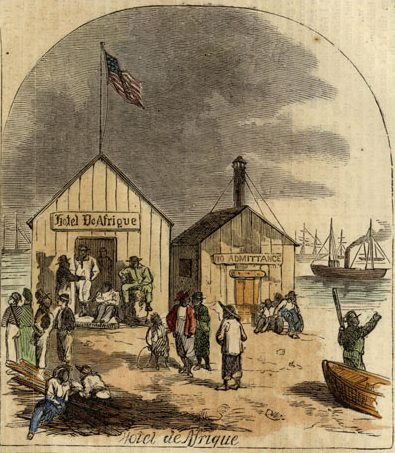Hotel De Afrique
(Present Day Dare County)
Featured Character – 1861-1862

Illustration from the February 15, 1862 Edition of Harper's Weekly Showing the First Safe Haven for Runaway Slaves in North Carolina
Courtesy of the Outer Banks History Center
Almost as soon as Union forces arrived on the Outer Banks, slaves sought refuge behind Federal lines. So many runaway slaves fled to the army that the New York Times of January 29, 1862 reported that a “Capt. Clark has erected a very commodious wooden house on the beach for the use of fugitives who have recently arrived from Roanoke Island. It is christened ‘Hotel de Afrique.’” The newspaper went on to describe the escaped slaves as “very expert boatmen, and are very useful in pulling about the inlet and working along the shore." Unfortunately, not all Union soldiers thought so highly of the former slaves. On March 11, 1862, Union Colonel James Nagle of the 48th Pennsylvania Regiment gave orders to Companies A, B, C, D, H, and I to reinforce General Ambrose Burnside at New Bern the following day. However, when the companies went to board the steamer George Peabody at Hatteras Inlet, they found it had run aground, and so with orders to establish a bivouac on the beach, they began to drink into the night. Soon fighting broke out, and officers were unable to control their men. Around midnight, some men from Company C broke into the Hotel de Afrique, an establishment for the shelter and protection of escaped slaves. Here, the men of Company C attacked the defenseless occupants with knives and bayonets, and fatally wounding one man. On the morning of March 13, James Wren wrote in his diary,
“Slept Very little last night on account of the men who ware drunk bawling around the shelter like a lot of mad men…Old Gallaway, [Colonel Nagle's] Coulered servent, having bin in for the night, received a Cut in the stomach which will undoubtedly prove fatal. A Contarband had a finger Cut off, the sinew of his left hand Cut.”
Galloway did die, and Colonel Nagle, furious, reprimanded the regiment, but the murderers remained unidentified.